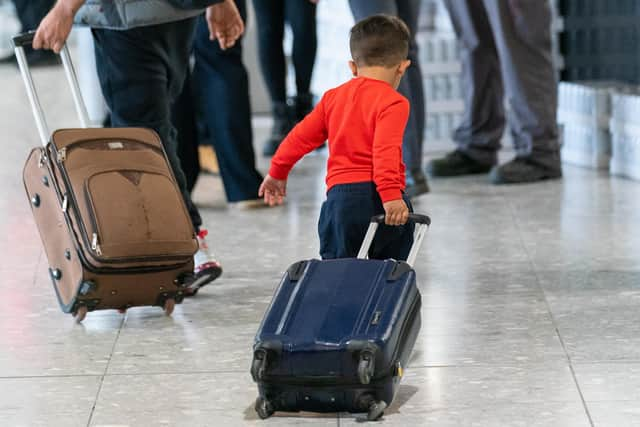Afghan families have been let down by the government’s failure to live up to its promise of a warm welcome - Luke Tryl
Months of limbo in cramped hotel rooms, little support to find housing, unsuitable offers of accommodation at the other end of the country, rejected application after rejected application, and that constant feeling of being at the back of a queue. A snapshot of what we heard when we spoke with more than 100 Afghans in hotels across the country.
These reflections from Afghans, along with conversations with support workers and policy experts, form part of our new report released early this week drawing out the lessons from the UK’s experience of welcoming around 25,000 Afghans since the fall of Kabul. The bottom line is that Afghan families - many of whom risked their lives to support our armed forces - have been let down by the government’s failure to live up to its promise of a warm welcome.
Advertisement
Hide AdAdvertisement
Hide AdFrom Bradford to Swindon, London to Leeds, Afghans told us about life in cramped hotel accommodation unable to start rebuilding their lives here in the UK. As we mark the anniversary of their escape from the Taliban, many are being plunged again into uncertainty with eviction notices coming into effect by the end of this month, and dozens of Afghan families now face the prospect of becoming homeless, and spending yet more time in emergency accommodation.


While there has been some success in pre-matching families with permanent accommodation in recent months, for which Cabinet Office Minister Johnny Mercer’s team deserves credit, many Afghans have faced hard choices of having to uproot their lives, pull the kids out of school, find new jobs and move hundreds of miles to other corners of the country - either because it was the only take-it-or-leave-it option given to them, or because they could no longer afford to stay where they were in big cities.
The support offered by councils has been patchy. Afghans and their support workers told us that local authority delays meant that offers for housing and jobs often fell through. It’s no surprise that, when asked, Afghans express high levels of trust in the British people, but low trust in local authorities.
While Afghans who were welcomed to the UK over the last two years were given the right to work, they weren’t supported with the tools needed to get into work. Only a third of Afghans responding to our survey had proficient or fluent English. In Afghanistan, they were interpreters and entrepreneurs, doctors and dentists, teachers and journalists, but here in Britain, they haven’t been offered the chance to get ahead and that starts with better support to help Afghans learn English here in the UK.
Advertisement
Hide AdAdvertisement
Hide AdTwo years in temporary hotel accommodation is clearly unsuitable for many with large families, and a £1m a day bill isn’t fair on the taxpayer either. A bank of suitable private housing needs to be built up with social landlords ahead of more Afghans arriving in the coming months, and should be used to build up capacity for future cohorts elsewhere.
That is not to say the entire scheme has failed. 10,000 Afghans now have a home of their own – many have put down roots in communities across the country, are at school or have begun working. Two years ago, the government moved quickly to set up schemes to welcome Afghan refugees in the UK. While the funding for the scheme was slow to come, when it came it was much welcomed. Despite the frustrations of the scheme, the Afghans we spoke to were deeply grateful for the sanctuary that people in Yorkshire and across the UK have offered them.
But the biggest opportunity for future welcome efforts comes from the generosity of people across Yorkshire and the country more broadly. The Homes for Ukraine scheme has shown the depth of potential for community-led refugee welcome in the UK - including many communities in Yorkshire.
Homes for Ukraine shouldn’t be seen as a one-hit wonder, but as a blueprint for future groups of refugees seeking sanctuary. While that scheme can’t be copied exactly for every future cohort of refugees, many elements from help finding employment and housing to supporting people’s integration into the UK could be.
Advertisement
Hide AdAdvertisement
Hide AdMore in Common’s research finds that almost three-quarters of those Homes for Ukraine hosts ready to host again would be willing to support Afghan families. What’s more, community-led schemes command greater public confidence, empower local residents and create a faster path for integration.
It’s still possible to get Operation Warm Welcome back on track for those Afghans already here, while also learning from the failures and the successes of the last two years.
Luke Tryl is the UK director of More in Common.